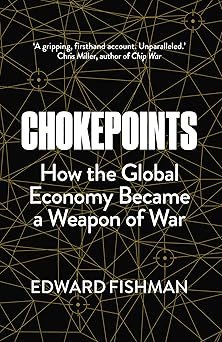Chokepoints: How the Global Economy Became a Weapon of War
Chokepoint explores how the U.S. leverages control over key “chokepoints” in the global economic system and the subtle but powerful mechanisms of influence that shape international relations. For anyone interested in how “soft” warfare plays out through sanctions, trade restrictions, and financial control, this book provides a comprehensive and timely overview.
Given the ongoing tariff and trade tensions between the U.S. and other major powers, this is a particularly relevant read. Fishman, a former diplomat, offers a well-informed perspective that combines policy experience with clear, engaging storytelling. He examines a range of historical cases, from Iran and Russia to China, showing how U.S. sanctions have evolved over the decades and how economic leverage can be as effective as military might.
We often think of geopolitical conflict in terms of physical warfare, but Chokepoint takes us behind the scenes of the non-military levers nations use to assert dominance. Fishman does an excellent job explaining how these tools operate within the broader web of globalisation and how their effects often ripple far beyond the intended targets.
At just over 350 pages, it’s not a light read, and the audiobook version may be a more accessible way to digest it. Once you’ve grasped the concept through the early examples, the subsequent chapters reinforce rather than expand upon it, though they still offer valuable context and depth.
By the end, you’re left with a deeper understanding of how sanctions function as instruments of modern power and how they might evolve in the years ahead. The book also invites reflection on the unintended consequences of global interdependence, particularly in an age where digital communication and economic entanglement have made the world both more connected and more fragile.
Fishman’s work sits comfortably alongside books like Chris Miller’s Chip War, which is even referenced in Chokepoint’s promotional material. If you found Chip War fascinating, you’ll likely enjoy this as well. Conversely, if you found Chip War too dense, you might feel similarly here though Fishman’s writing is somewhat more narrative in style.
Who’s it for?
If you have an interest in global macroeconomics, geopolitics, or the intersection of economics and statecraft, this is a worthwhile read. Investors will also find it insightful for understanding how geopolitical decisions cascade into financial markets. However, this isn’t a casual or lightweight read but it rewards your patience and curiosity if you’re willing to see it through.

